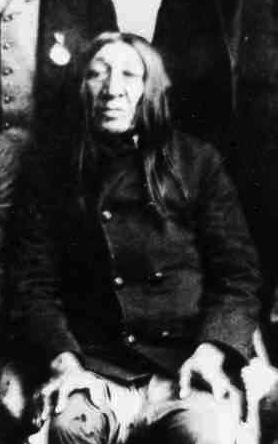Kā-kīwistāhāw facts for kids
Kā-kīwistāhāw (also known as Kahkewistahaw) was an important leader of the Plains Cree people in Canada. His name means "He Who Flies Around." He was born around 1810 and lived until 1906. He worked hard to protect his community and their land.

Contents
A Leader of the Plains Cree
Kā-kīwistāhāw's father, named Le Sonnant, was also a respected leader. He was a medicine man and a brave warrior. Le Sonnant was one of the people who signed the Selkirk Treaty in 1817. This treaty was an agreement between different groups.
Signing Treaty 4
Kā-kīwistāhāw became a chief and signed Treaty 4 himself. This important agreement created special areas called reserves for each Indigenous group. In 1881, his tribe's reserve was officially measured. It was located in a beautiful area near the Qu’Appelle Valley. It was between Round Lake and Crooked Lake.
Life on the Reserve
Once the reserve was set up, many people, including Kā-kīwistāhāw, changed their way of life. They stopped their traditional buffalo hunting. Instead, they started farming and raising cattle. The land on the reserve was very good for growing crops. Also, the Canadian Pacific Railway was built nearby. This made the reserve even more valuable.
Protecting the Land
Over time, Kā-kīwistāhāw faced pressure to sell parts of his people's land. Some people wanted to buy it for white settlers. But Kā-kīwistāhāw was very strong. He always refused to sell or give up any of his territory. He wanted to keep the land safe for his community.
A Time of Peace
In 1885, there was a conflict known as the North-West Rebellion. Many Plains Cree leaders did not join this rebellion. Kā-kīwistāhāw was one of them. He told his Indian Agent that his people would stay on their reserves. He promised they would continue their work peacefully. He even offered to protect the agent's family if they were in danger.
A Special Trip
Because of his loyalty, Kā-kīwistāhāw was chosen for a special trip in 1886. He traveled to Brantford, Ontario, with other loyal chiefs. There, they attended the unveiling of a memorial. This memorial honored Joseph Brant, a famous leader.
Later Years
Kā-kīwistāhāw passed away in 1906 on his reserve. He had been a strong and steady leader for his people. Sadly, just one year after his death, his tribe had to give up 70% of their land.
 | Selma Burke |
 | Pauline Powell Burns |
 | Frederick J. Brown |
 | Robert Blackburn |

